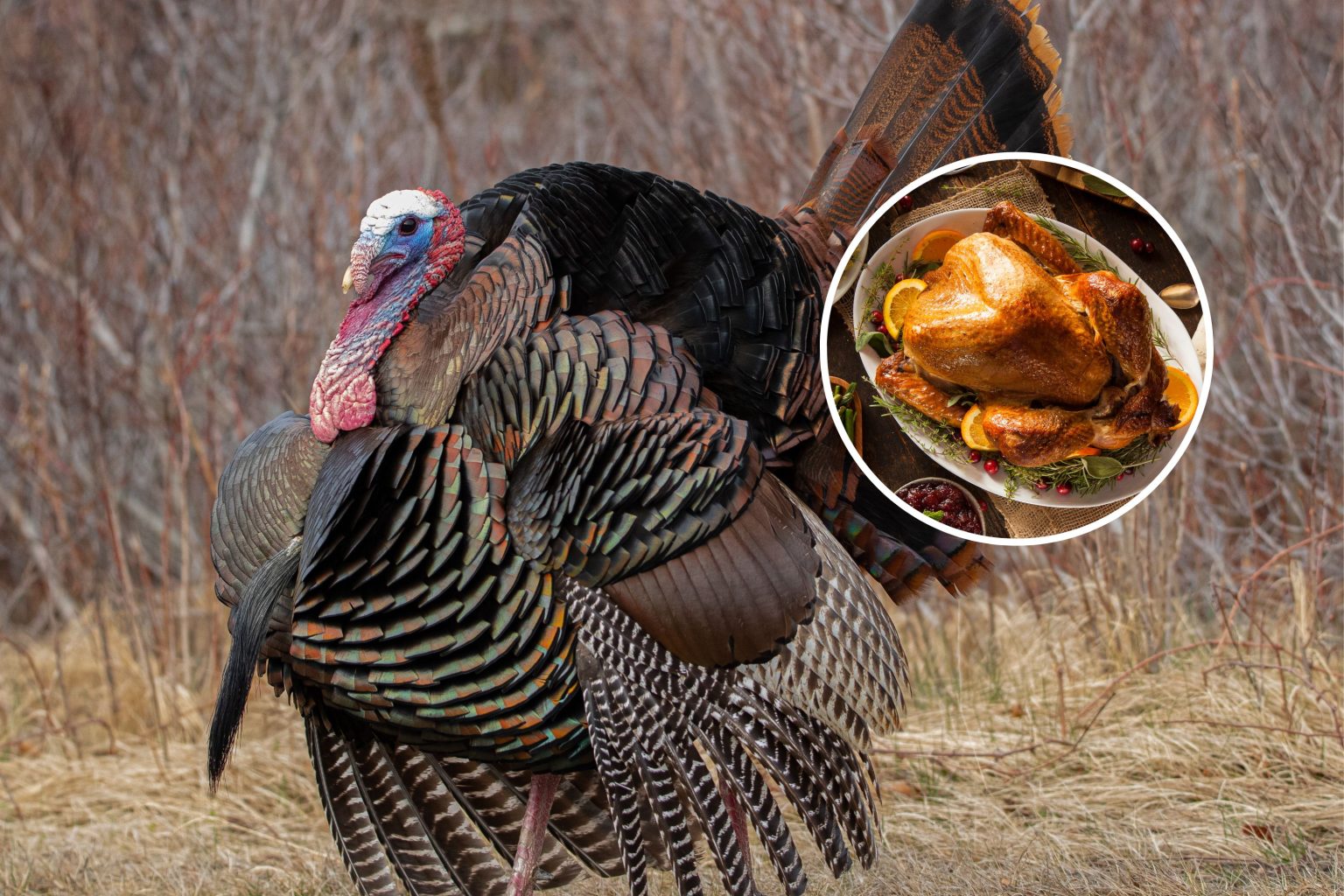Summarize this content to 2000 words in 6 paragraphs Tables across the country may look very different at Thanksgivings in the future if hunting practices don’t change, research has warned.According to a new paper in the journal Royal Society Open Science, unless turkey hunters change their behaviors, the seasonal bird may become increasingly difficult to harvest in coming years, all thanks to evolution.This is because a large number of male turkeys were found in the study to be risk-takers, which may lead to them getting killed in great numbers. However, the remaining turkeys may learn over the generations from their adrenaline-junkie kin, in turn becoming much more difficult for hunters to harvest.
Stock image of wild turkey (main) and a Thanksgiving turkey (inset). Turkeys may become harder to harvest over time due to their risk-taking behavior.
Stock image of wild turkey (main) and a Thanksgiving turkey (inset). Turkeys may become harder to harvest over time due to their risk-taking behavior.
ISTOCK / GETTY IMAGES PLUS
“Hunters should be willing to adapt because the turkeys are also adapting as well. If we continue to harvest individuals that are close to risky areas associated with hunters, turkeys will adjust their behavior and could become harder to detect and harder to harvest,” study co-author Nickolas Gulotta, a doctoral student at the University of Georgia’s Warnell School of Forestry and Natural Resources, said in a statement.In the paper, the researchers described how they studied the behavior of 109 wild turkeys across Georgia, observing their risk-taking in response to the presence of hunters and their natural predators.They found that many of the turkeys were often daring, moving close to areas where hunters frequented, such as parking lots, trails, and roads.”If turkeys are closer to these open areas, it’s going to be easier for both a hunter and a predator to detect them. Across both study sites in general, turkeys that took more risks were more likely to be harvested,” Gulotta said.Hunters may be able to kill a large number of turkeys as a result of this risky behavior, however, after a while, the birds may soon learn to stop acting so rashly, evolving over time to be more risk-averse.”Turkeys are obviously adapting and learning that if you’re closer to risky areas, then there’s potential to be harvested. That’s why some of them are adopting less risky behaviors that essentially make them less detectable,” said Gulotta.”If hunters harvest birds that are riskier and more detectable, it could become more difficult to harvest turkeys because we could be left with a bunch of individuals that are harder to detect.”Turkeys that fly (no pun intended) under the hunters’ radar often stay in one place rather than moving around, frequently in areas with a large tree coverage, and are quieter than their gobbling counterparts.However, turkeys that show these behaviors after the hunting season ends may find themselves more vulnerable to attack from their natural predators, such as raccoons, rodents, coyotes, hawks, owls, cougars and foxes, among others.”There are certain traits associated with outlasting the hunting season, like hiding in areas with good cover and reducing the distance traveled within a day. But in turn, if turkeys stay in the same area and don’t travel a lot, then they’re going to be more likely to be detected by a predator,” said Gulotta.”It’s kind of a Catch-22 where if they can survive that hunting season, they’re most likely going to be fine. But at the same time, too, if they don’t travel that fast and are predictable, then they have the potential to be killed by a predator.”The researchers suggested that hunting tactics need to be changed based on the local conditions to ensure that turkeys don’t become harder and harder to harvest as time goes on.”Significant [harvest-induced selection] acts on risk-taking behaviors in both populations, which could render wild turkeys more difficult to harvest if these traits are indeed heritable,” the researchers wrote in the paper.Do you have a tip on a science story that Newsweek should be covering? Do you have a question about turkeys? Let us know via science@newsweek.com.ReferencesGulotta, N. A., Wightman, P. H., Collier, B. A., & Chamberlain, M. J. (2024). The role of human hunters and natural predators in shaping the selection of behavioural types in male wild turkeys. Royal Society Open Science, 11(11). https://doi.org/10.1098/rsos.240788


